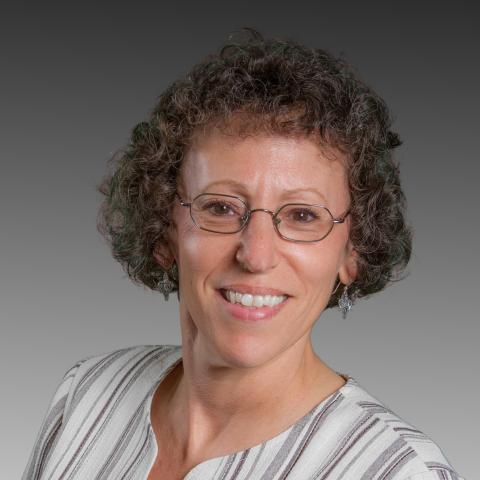Associate Dean for Retention and Student Success and Adjunct Professor

Biography
Joanne Goldwater has been at SMCM for over 30 years, starting as the Director of Residence Life in 1993. In 2000, she was promoted to the Assistant Dean position, in 2006 to the Associate Dean of Students position, and in 2016 to her current role. She is also an instructor for the Introduction to Sign Language course and for Professional Pathways courses (LEAD111, LEAD112). Before coming to SMCM, Joanne worked at Western Maryland College (now known as McDaniel College) for six years, and as the dorm director at Central NC School for the Deaf for six years. Joanne is the co-founder of the Regional Entry-Level Institute and served as the co-director from 1998-2017. She is the Past Chair of the Association of College and University Housing Officers International (ACUHO-I) Foundation Board, a Past President of Mid-Atlantic Association of College and University Housing Officers (MACUHO), a former Eastern District Representative and the Regional Affiliations Director for ACUHO-I. Joanne has been recognized by ACUHO-I with the Herstory Award, a Parthenon Award for outstanding leadership and service to ACUHO-I and the housing profession, and the James Grimm Leadership and Service Award. She also received the Omicron Delta Kappa Robert Morlan Faculty Secretary of the Year Award. She received multiple recognitions from MACUHO, including the Outstanding Service and Distinguished Service awards. In 2015, MACUHO created The Joanne Goldwater Distinguished Senior Level Housing Professional Award. In 2013, she received the SMCM SGA Best Club Advisor Award. Joanne is a frequent presenter at regional and international conferences. Joanne is now an empty-nester living in Southern Maryland with her husband.
Internal Affiliations
External Affiliations
Education
-
B.S. in Education of the Deaf at University of North Carolina - Greensboro, 1981
-
M.Ed. in Counseling and Guidance at University of North Carolina - Greensboro, 1986
Awards
- SMCM Student Government Association Best Club Advisor Award
In recognition of valuable contributions as the club advisor to the Relay For Life Club.
- ACUHO-I Parthenon Award
Recognizing outstanding leadership and service to ACUHO-I and the housing profession.
- ODK Robert Morlan Faculty Secretary of the Year Award
For leadership and dedicated service to Omicron Delta Kappa (the National Leadership Honor Society).
- James Grimm Leadership and Service Award
For dedicated service and outstanding leadership in strengthening the goals and objectives of ACUHO-I.
Spotlight
- Learning to Take Care of Yourself So You Can Take Care of Others Webinar
This session explored the stressful nature of Student Affairs work within higher education, its impact on Student Affairs administrators, and strategies to respond effectively to this stress. It was designed for all levels of staff within Student Affairs. According to Business Insider, Higher Education Administrators and Mental Health Counselors are two of the top 14 most stressful jobs in America, highlighting the reality that we must take care of ourselves first in order to be at our best to help others. Managing our stress and balancing our workloads is essential. In this presentation we examined some of the broader philosophical issues that contribute to this stress such as mixed messages around a customer service approach vs a student/developmental approach and changing roles of parents and millennial students. We explored the value of focusing inward (meeting our personal needs) not just outward (meeting our students’ needs). This process involves dealing with our desire to feel needed vs the needs of our students, setting expectations, establishing boundaries, and creating a healthy environment. We explored how to create resilience within a student affairs context, manage stress, create a life outside of work, and avoid burn-out
- Regional Entry-Level Institute (RELI)
The Regional Entry Level Institute is an intensive professional development seminar featuring a range of activities for entry-level professionals who aspire to mid-level positions in residence life and beyond. Created by veteran residence life professionals Joanne Goldwater and Tom Ellett, RELI:
- Helps staff identify and develop skills and perspectives necessary to move to a mid-level position;
- Offers personalized guidance in mapping out short- and long-term career goals;
- Connects entry-level staff with faculty who are veteran professionals in residence life and related fields;
- Provides one-on-one and small-group mentoring time;
- Creates an environment conducive to connecting with other new professionals, providing support and the foundations for lasting collegial relationships.
RELI celebrated its 17th anniversary in 2014 and graduated its 425th participant with this year’s class.
AT THE INSTITUTE - RELI participants:
- Assess current skill levels and devise professional development plans;
- Attend sessions facilitated by veteran professionals in housing/residence life and student affairs and faculty members in related academic programs;
- Gain proven, practical information about surviving and thriving at the next level.
To ensure the intended learning environment, only 28 RELI participants are accepted each year. Participants are placed into small groups and assigned a faculty member who provides individual advice, support and suggestions for future professional growth.
- Dealing with Difficult Student Employees Webinar
This session (which will be presented again in October) explored the topic of Dealing with Difficult Student Employees and gave participants some strategies to cope with them. It was designed for supervisors, from frontline office supervisors working with work-study students or student receptionists to administrators working with para-professional employees (such as Resident Assistants or Peer Mentors), volunteers (such as Orientation Leaders), and interns.
We examined: How to identify, communicate and hold student workers accountable to expectations/roles/responsibilities; what are the biggest challenges in dealing with difficult student employees; training suggestions; motivating employees that lack motivation; dealing with parents of student employees; managing conflict between student employees; and supervisory tips.
